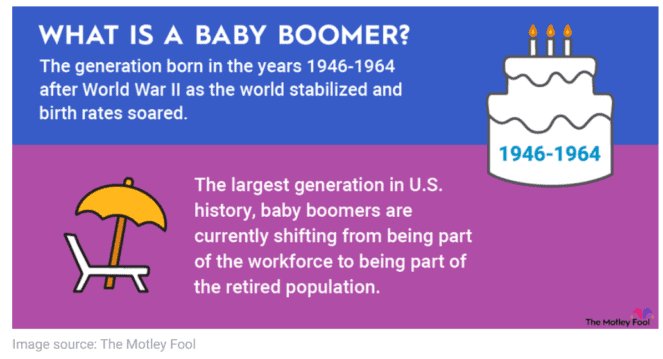The baby boomer generation is the group of people born in the years after World War II, when the world stabilised and birth rates soared. The largest generation in US — and Australian — history, baby boomers are currently shifting from the workforce to the retired population.
Here's a rundown of who baby boomers are, where they fit in the context of the generations, and what it means in investing and finance.
What is a baby boomer?

According to most sources, a baby boomer is someone born between 1946 and 1964, although the exact dates can vary a bit.
The term refers to the increase in birth rates in the United States, Australia and elsewhere in the developed world after World War II.
The US population increased by almost 2.4 million between 1940 and 1950. In Australia, the population grew from just over 7 million in 1940 to 8 million in 1950. Birth rates surged in the early 1940s and peaked in 1949, remaining historically elevated well into the 1960s.
The term has been used since at least 1963 to describe the surge in college enrollment as the "boomers" started to come of age. More baby boomers (76 million) were born in the United States than any generation before or since.
As mentioned, the exact definition of the term baby boomers depends on where you are and what source you're looking at.
Baby boomers and other generations
Here's a look at the living generations and the approximate birth years that are typically included in each one:

As far as the comparative sizes of the generations, we obviously don't know quite how large the youngest generations are just yet since there isn't a clear consensus yet on where Gen Z ends and Generation Alpha is still forming.
Why the baby boomer generation is important to investors and finance
Many economists have theorised that the gradual retirement of the baby boomer generation would lead to a slowing economy, and this certainly makes sense. After all, if you remove the largest component of the labour force, the economy as a whole will be less productive.
That's especially true because the generations that will replace the boomers have relatively lower birth rates and are shaping up to be significantly smaller.
So far, there hasn't been a massive impact, but we're still relatively early in the retirement phase of the baby boomers. The youngest boomers are still in their late 50s, and more people than ever are working beyond the traditional retirement age of 65.
The fact that the large millennial generation (mostly baby boomers' children) are also reaching their peak productivity years is helping to offset the effect.
However, beyond a general economic slowdown, there are some other economic implications. Social Security and Medicare are good examples; the retirement of the baby boomer generation is expected to lead to large deficits in both programs. There is much debate over the best way(s) to fix these programs, but the transition of the baby boomer generation from paying to collecting benefits is expected to be costly.
For investors, the retirement of the baby boomer generation could create some interesting opportunities, especially in healthcare. The older segments of the population are expected to double (or more) in size over the next couple of decades; older Americans and Australians use healthcare services more often and spend more when they do.
Opportunities that could arise from the retirement of baby boomers include senior housing, pharmaceutical research, medical office real estate, and more.
The bottom line on baby boomers
Baby boomers are the largest generation in recent history and are in the process of reaching retirement age. Because of their size and the relatively lower birth rates of the youngest generations, this has several big implications for the economy and investors.

